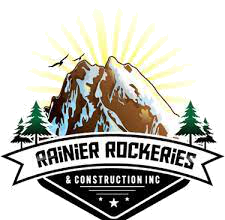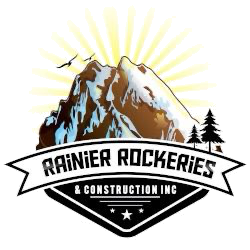If your home is on a slope—or you’re upgrading your yard with retaining walls or patio spaces—outdoor steps and risers are key to both function and style. In Seattle, where rain and elevation changes are common, the right materials can make all the difference in safety, longevity, and curb appeal.
Here’s a clear guide to the best materials for outdoor steps and risers, and how to choose the right one for your space.
Why Material Choice Matters in Seattle
Seattle’s rainy climate creates specific challenges for outdoor stair systems:
- Slippery surfaces can become dangerous
- Moss and mildew grow quickly on porous surfaces
- Drainage and erosion can affect step stability
That’s why the steps and risers you choose must be slip-resistant, weather-tough, and properly installed to handle moisture and slope.
At Rainier Rockeries, we build custom steps that check every box—durable, beautiful, and safe for daily use.
Top Materials for Outdoor Steps & Risers
We work with trusted vendors like Marenakos Rock Center, Belgard, and Mutual Materials to source high-performance materials built for Pacific Northwest homes.
1. Natural Stone Steps
Nothing beats the timeless look of natural stone. It’s rugged, rich in texture, and incredibly strong.
Common types:
- Basalt: Dark, dense, and textured. Excellent for wet climates.
- Huckleberry Step Treads: A Pacific Northwest favorite with a natural gray-blue tone.
- Bluestone or Flagstone: Flat and smooth for safe footing.
Pros:
- Naturally slip-resistant
- Withstands freeze/thaw cycles
- Beautiful and unique from piece to piece
- Pairs well with rock retaining walls
Cons:
- Heavier to install
- Slightly more expensive than concrete
Best for: Rustic, craftsman, or mountain-style homes with other stone features.
2. Precast Concrete Steps & Risers
Concrete risers and step kits offer consistency and clean lines. They’re customizable and budget-friendly.
Pros:
- Uniform dimensions
- Can be dyed, stamped, or textured
- Low-maintenance and durable
- Slip-resistant finishes available
Cons:
- Basic gray can look plain without finishing
- May need sealing to resist staining
Best for: Modern or transitional homes, straight runs of stairs, tight spaces.
3. Modular Block Step Kits
Some systems from Belgard or Mutual come with modular step units that match pavers and wall blocks.
Pros:
- Built to match retaining walls or patios
- Quick installation
- Several textures and colors
Cons:
- May not suit every layout (best on flat-to-slight slope)
- Modular look may not be right for rustic designs
Best for: Matching with a paver patio or retaining wall system.
4. Wood (with Stone or Concrete Treads)
While we don’t recommend untreated wood in wet climates, wood-framed stairs with stone or concrete treads can work well in certain designs.
Pros:
- Elevated framing can adjust to steep terrain
- Wood risers can be hidden with stone veneer
- Often used for decks or raised patios
Cons:
- Requires more maintenance
- Wood can rot or warp if not sealed
Best for: Custom hillside builds, decks with built-in stair access.
Safety First: Slip Resistance Matters
Seattle’s wet weather makes non-slip surfaces essential. Here’s what we recommend:
- Textured stone or broom-finished concrete
- Deep treads and short risers for comfortable stepping
- Integrated drainage behind and beneath steps
- Optional grip strips or embedded textures
Step Design Ideas for Seattle Yards
We install steps in a variety of styles to match your home’s look and the layout of your yard.
Popular Layouts:
- Straight Runs: Clean, simple, best for walkways or patios
- L-Shaped or Wraparound: Great for tiered yards or around retaining walls
- Landings Between Flights: Adds safety and style for steeper slopes
Functional Add-Ons:
- Low-voltage step lights
- Integrated retaining walls
- Turf or gravel between landings
- Railings or boulder edges for safety
FAQs
What’s the best material for slip-resistant outdoor steps?
Basalt and textured concrete are top picks for wet Seattle weather. Both offer good traction and stand up to moss growth better than smooth stone.
Can you build steps into a retaining wall?
Yes. We often build steps directly into rock or block retaining walls, using matching materials for a seamless look.
How much do custom outdoor steps cost?
It depends on the material, size, and terrain. Most projects range from $1,000 to $5,000+. We’ll provide a clear, itemized quote during your consultation.
Why Choose Rainier Rockeries?
We’re not just step builders—we’re outdoor transformation pros. Every project is handled with precision and care.
Why local families trust us:
- We own our heavy equipment (no delays or rentals)
- Angel, the owner, checks every project
- We’re experts in drainage, grading, and hillside stabilization
- Over 70+ five-star reviews from Seattle-area clients
Whether you need two steps or a full hillside staircase, we’ve got you covered.
Let’s Build Steps That Last
A safe, stylish set of outdoor steps can completely change how you use your yard. Let Rainier Rockeries design a solution that fits your space—and Seattle’s weather.
📞 Call (425) 260-1595
💬 Request a quote online

